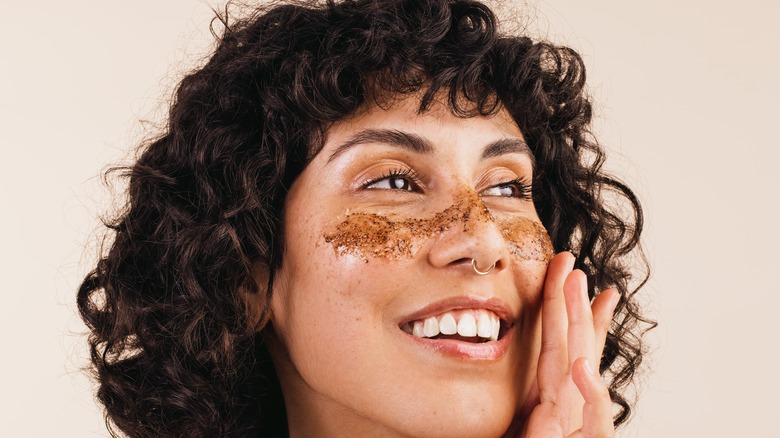Is Coffee Bad For Your Skin?
Coffee is a big deal for many people worldwide. These aromatic beans are described as psychoactive stimulants essential for battling fatigue and increasing energy levels, per Healthline. According to the Mayo Clinic, up to 400 milligrams of caffeine daily is safe for most adults. This amounts to 100 milligrams of caffeine per regular eight-ounce cup of coffee, consumed no more than four times a day.
But what happens if you consume too much caffeine? In terms of coffee, you might have heard that an excessive consumption habit may increase your susceptibility to various skin disorders. On the contrary, you may have also heard that coffee can complement your skincare routine when applied topically, so which one is correct? Furthermore, can coffee ruin your skin?
This question can't be answered with a hard "yes" or "no." Before you set out to divorce your coffee drinking habits, it's crucial to understand the various angles of the "coffee and skin" debate.
Coffee might be linked to higher stress levels
If you're convinced that your coffee intake is to blame for your deteriorating skin health, it helps to assess the amount you consume daily. A 2002 study published in Psychosomatic Medicine suggests that high coffee consumption can be linked to increased stress levels. James D. Lane, lead study author and associate research professor at Duke University School of Medicine, linked caffeine intake to an exaggeration of the body's response to stress. This includes elevated levels of blood pressure and stress hormones.
A 2006 study published in Pharmacology Biochemistry and Behavior found that repeated caffeine doses throughout the day increase cortisol levels in both men and women. Furthermore, cortisol triggers the brain to release corticotrophin-releasing hormone (CRH), producing oil on the skin glands. This can clog your pores, leading to skin breakouts, per Healthline.
The addition of milk products in each cup of coffee might also contribute to breakouts. For example, the American Academy of Dermatology Association cites several studies that linked cow's milk to acne.
Topical application may be beneficial for skin health
Despite negative press on caffeine and skin health, the American Chemical Society found that coffee is the top source of antioxidants among Americans. The rich antioxidants found in coffee include hydrocinnamic acids and polyphenols. Antioxidants, in general, can help fight free radicals that cause premature aging and other skin disorders (via Healthline).
It might surprise you to know that applying caffeine directly to your skin is also associated with various benefits, as suggested in a 2011 trial published in the International Journal of Cosmetic Science. In fact, some of the most effective eye creams are noted for their caffeine content. A 2015 study published in the Advanced Biomedical Research investigated the anti-wrinkling efficacy of eye counter pads soaked in an emulsified Emu oil base, made up of caffeine and vitamin K. After being tested on 11 healthy women, there was a clear reduction in the depth of dark circles and wrinkles after four weeks.
Coffee beans are also high in niacin, which is a special type of vitamin B3 that reduces the skin's vulnerability to eczema, acne, and other inflammatory skin conditions (via Healthline). According to a 1991 study published in Nutritional and Toxicological Consequences of Food Processing, coffee can have between 10 to 40 milligrams of niacin per 100 grams of coffee beans, depending on rawness.



